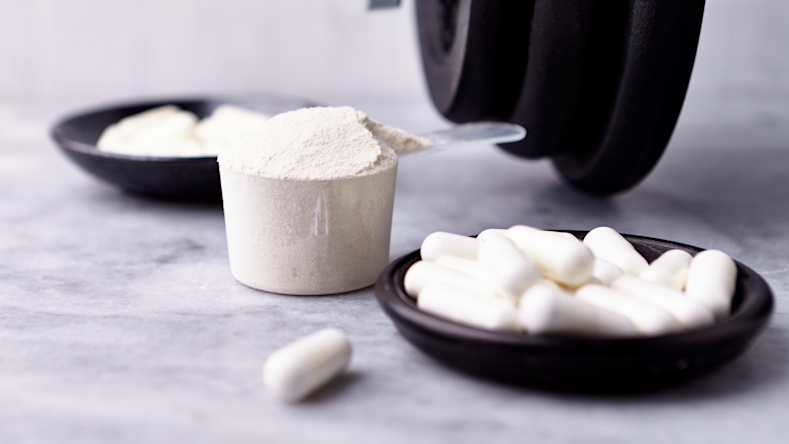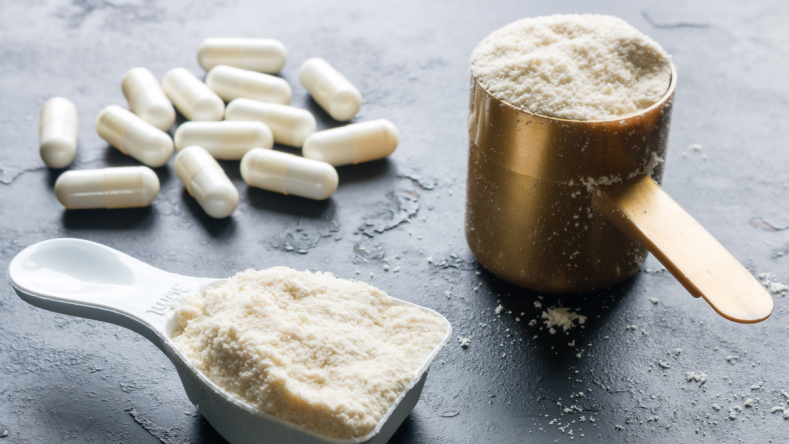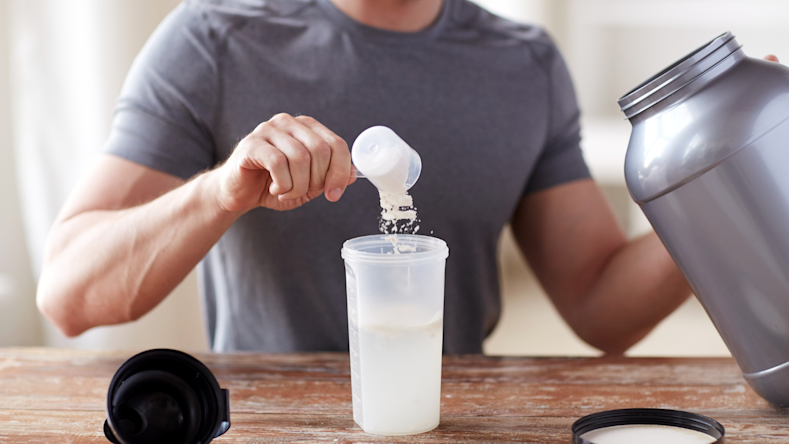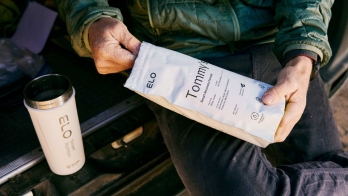Should you add creatine to protein powder?
Creatine’s positive impact on energy, muscle mass, and strength could make it the key to enhanced athletic performance. But what does science have to say about adding it to protein powder? Here’s what you need to know about fueling your gains with creatine.

If you’re an athlete looking to enhance your strength, chances are you’ve seen creatine supplements sitting on the shelves at your gym or local health food store. This supplement has become a staple in the fitness community as it is suggested to help you increase muscle mass, endurance, and overall performance. But, should you mix it with protein powder to add even more fuel to your gains? Before answering that question, let’s first understand what creatine is, how much you should take, and the health benefits surrounding it.
What is creatine?
Creatine is a compound formed of amino acids (such as L-arginine, glycine, and L-methionine), naturally found in muscle cells. It supplies energy to your muscles to aid with growth, strength and performance [ 1 15
Dietary recommendations
Research has found that your body needs between 1-3 g/day to maintain normal stores of creatine, but athletes may need to consume between 5 and 10 g/day to maintain optimal capacity of their stores [ 2
Studies have also suggested that consuming 0.3 g/kg of body weight/day can be effective in increasing muscle creatine stores. However, this can vary depending on your existing muscle mass, since the more muscle you have, the more creatine is stored [ 2 5

Are creatine supplements right for you?
You can get all the creatine you need from what your body naturally produces, as well as through some key dietary sources (such as fish, meat and other animal products). However, if you lift extremely heavy weights, participate in high-intensity workouts, or eat a plant-based diet, you may want to consider a creatine supplement [ 4
Research shows that excess creatine consumption (more than 20 g/day for over 5 days) can cause bloating and mild GI discomfort, so it’s recommended to talk with your healthcare provider to see if supplementation is right for you [
6
].
Health benefits of creatine
Creatine has been shown to boast a variety of health benefits, including:
Improved brain function. Research suggests that short term creatine supplementation of 20 g/day could have a positive impact on short-term memory, reaction time, and mental fatigue [
7
].Increased muscle mass. Studies have shown that when creatine is taken in combination with weight lifting, people gained an extra 3 pounds of lean muscle mass compared to those who only weight trained without supplementation [
3
,8
,9
].Glucose management. When combined with exercise, creatine has been found to improve glucose metabolism in insulin-resistant individuals [
10
].Enhanced athletic performance. Creatine allows your body to produce more energy, which is why athletes commonly turn to creatine supplements to help increase strength, power, and overall athletic performance [
2
].

Can you mix creatine with protein powder?
Since creatine and whey protein both increase muscle mass, athletes tend to take them in conjunction in hopes of taking their fitness gains to the next level. But what does the science have to say about mixing creatine with protein powder?
The results are a bit varied. Some research suggests that when taken in combination with resistance exercise, creatine and whey protein powder can increase creatine retention, increase muscle mass and boost performance [ 2 11 12 13
Despite some mixed results, research seems to suggest that there are not many additional benefits to mixing creatine with whey protein powder, as both are effective enough on their own. However, you may decide to take them together for the sake of convenience [ 14
Protein recommendations
Eating enough protein for your goals may decrease reliance on supplements. How much protein you need varies with age and can increase significantly with physical activity, injury, or illness. The Dietary Reference Intake (DRI) for protein for adults is as follows:
Men and women: 0.8 g protein/kg of body weight/day [
16]
Over 65 years old: 1 to 1.2 g protein/kg of body weight/day [
17
]
Protein recommendations for athletes and highly active men and women range from 1.2-2.0 g/kg of body weight/day, depending on training needs and goals [ 18 19 20

Introducing Elo Smart Recovery
Elo Smart Recovery is the world’s most personalized recovery product, offering a combination of high-quality protein, functional nutrient boosts such as super greens and turmeric, and real-time dosing recommendations tailored to your needs and workout. Your unique Smart Recovery blend is determined using a combination of data from wearables and activity apps, dietary preferences, and goals. Your information is then matched with the latest scientific research to determine a blend of ingredients that both maximizes post-workout recovery and supports your health goals. Learn more about how it can enhance your recovery.
Summary
Creatine has a wide array of health benefits (including improved brain function and glucose management), but it is most widely known in the fitness community for its positive impact on energy, muscle mass, strength, and recovery time. As such, athletes tend to take creatine in conjunction with whey protein powder with goals of taking their fitness gains to the next level. However, while results are a bit varied, studies have found no additional benefits to mixing creatine with whey protein powder, since both are effective on their own.
Disclaimer: The text, images, videos, and other media on this page are provided for informational purposes only and are not intended to treat, diagnose or replace personalized medical care.
Key takeaways
Creatine is a compound produced naturally in your body, and its main function is to supply energy to your muscles to help with growth, strength and performance.
Research has found that your body needs 1-3 g/day to maintain normal creatine stores, but athletes may need to consume between 5 and 10 g/day to maintain and optimize their stores [
2
].Research suggests that short term creatine supplementation of 5–20 g/day could have a positive impact on short-term memory, reaction time, and mental fatigue [
7
], though anything over 20g/day for more than 5 days may have adverse GI effects [6
].Creatine allows your body to produce more energy, which is why athletes commonly turn to creatine supplements to help increase strength, power, and overall performance [
2
].
References
Creatine & Creatine supplements: What is creatine, are supplements safe. Cleveland Clinic. (n.d.). Retrieved January 29, 2022, from
https://my.clevelandclinic.org/health/articles/17674-creatine-and-creatine-supplements
Kreider, R. B., Kalman, D. S., Antonio, J., Ziegenfuss, T. N., Wildman, R., Collins, R., Candow, D. G., Kleiner, S. M., Almada, A. L., & Lopez, H. L. (2017). International Society of Sports Nutrition Position Stand: Safety and efficacy of creatine supplementation in exercise, sport, and medicine. Journal of the International Society of Sports Nutrition, 14(1).
https://doi.org/10.1186/s12970-017-0173-z
Eliot, K. A., Knehans, A. W., Bemben, D. A., Witten, M. S., Carter, J., & Bemben, M. G. (2008). The effects of creatine and whey protein supplementation on body composition in men aged 48 to 72 years during resistance training. The journal of nutrition, health & aging, 12(3), 208–212.
https://doi.org/10.1007/BF02982622
Kaviani, M., Shaw, K., & Chilibeck, P. D. (2020). Benefits of Creatine Supplementation for Vegetarians Compared to Omnivorous Athletes: A Systematic Review. International journal of environmental research and public health, 17(9), 3041.
https://doi.org/10.3390/ijerph17093041
Shao, A., & Hathcock, J. N. (2006). Risk assessment for creatine monohydrate. Regulatory toxicology and pharmacology : RTP, 45(3), 242–251.
https://doi.org/10.1016/j.yrtph.2006.05.005
Deminice, R., Rosa, F. T., Pfrimer, K., Ferrioli, E., Jordao, A. A., & Freitas, E. (2016). Creatine Supplementation Increases Total Body Water in Soccer Players: a Deuterium Oxide Dilution Study. International journal of sports medicine, 37(2), 149–153.
https://doi.org/10.1055/s-0035-1559690
Roschel, H., Gualano, B., Ostojic, S. M., & Rawson, E. S. (2021). Creatine Supplementation and Brain Health. Nutrients, 13(2), 586. https://doi.org/10.3390/nu13020586
Rawson, E. S., & Venezia, A. C. (2011). Use of creatine in the elderly and evidence for effects on cognitive function in young and old. Amino Acids, 40(5), 1349–1362.
https://doi.org/10.1007/s00726-011-0855-9
Chilibeck, P. D., Kaviani, M., Candow, D. G., & Zello, G. A. (2017). Effect of creatine supplementation during resistance training on lean tissue mass and muscular strength in older adults: a meta-analysis. Open access journal of sports medicine, 8, 213–226.
https://doi.org/10.2147/OAJSM.S123529
Solis, M. Y., Artioli, G. G., & Gualano, B. (2021). Potential of creatine in glucose management and diabetes. Nutrients, 13(2), 570.
https://doi.org/10.3390/nu13020570
Bemben, M. G., Witten, M. S., Carter, J. M., Eliot, K. A., Knehans, A. W., & Bemben, D. A. (2010). The effects of supplementation with creatine and protein on muscle strength following a traditional resistance training program in middle-aged and older men. The journal of nutrition, health & aging, 14(2), 155–159.
https://doi.org/10.1007/s12603-009-0124-8
Eliot, K. A., Knehans, A. W., Bemben, D. A., Witten, M. S., Carter, J., & Bemben, M. G. (2008). The effects of creatine and whey protein supplementation on body composition in men aged 48 to 72 years during resistance training. The journal of nutrition, health & aging, 12(3), 208–212.
https://doi.org/10.1007/BF02982622
Outlaw, J., Burks, B., Hayward, S., Holt, J., Stone, M., Stai, B., Cox, B., Foster, C., Taylor, L., & Wilborn, C. (2013). Effects of post-exercise whey protein vs. whey protein plus creatine consumption in females. Journal of the International Society of Sports Nutrition, 10(Suppl 1), P20.
https://doi.org/10.1186/1550-2783-10-S1-P20
Burke, D. G., Chilibeck, P. D., Davidson, K. S., Candow, D. G., Farthing, J., & Smith-Palmer, T. (2001). The effect of whey protein supplementation with and without creatine monohydrate combined with resistance training on lean tissue mass and muscle strength. International journal of sport nutrition and exercise metabolism, 11(3), 349–364.
https://doi.org/10.1123/ijsnem.11.3.349
Persky, A. M., & Brazeau, G. A. (2001). Clinical pharmacology of the dietary supplement creatine monohydrate. Pharmacological reviews, 53(2), 161–176.
Jäger, R., Kerksick, C. M., Campbell, B. I., Cribb, P. J., Wells, S. D., Skwiat, T. M., Purpura, M., Ziegenfuss, T. N., Ferrando, A. A., Arent, S. M., Smith-Ryan, A. E., Stout, J. R., Arciero, P. J., Ormsbee, M. J., Taylor, L. W., Wilborn, C. D., Kalman, D. S., Kreider, R. B., Willoughby, D. S., Hoffman, J. R., … Antonio, J. (2017). International Society of Sports Nutrition Position Stand: protein and exercise. Journal of the International Society of Sports Nutrition, 14, 20.
https://doi.org/10.1186/s12970-017-0177-8
Bauer, J., Biolo, G., Cederholm, T., Cesari, M., Cruz-Jentoft, A. J., Morley, J. E., Phillips, S., Sieber, C., Stehle, P., Teta, D., Visvanathan, R., Volpi, E., & Boirie, Y. (2013). Evidence-based recommendations for optimal dietary protein intake in older people: A position paper from the Prot-Age Study Group. Journal of the American Medical Directors Association, 14(8), 542–559.
https://doi.org/10.1016/j.jamda.2013.05.021
Stokes, T., Hector, A. J., Morton, R. W., McGlory, C., & Phillips, S. M. (2018). Recent Perspectives Regarding the Role of Dietary Protein for the Promotion of Muscle Hypertrophy with Resistance Exercise Training. Nutrients, 10(2), 180.
https://doi.org/10.3390/nu10020180
Carbone, J. W., & Pasiakos, S. M. (2019). Dietary Protein and Muscle Mass: Translating Science to Application and Health Benefit. Nutrients, 11(5), 1136.
https://doi.org/10.3390/nu11051136
Deldicque L. (2020). Protein Intake and Exercise-Induced Skeletal Muscle Hypertrophy: An Update. Nutrients, 12(7), 2023.
https://doi.org/10.3390/nu12072023







